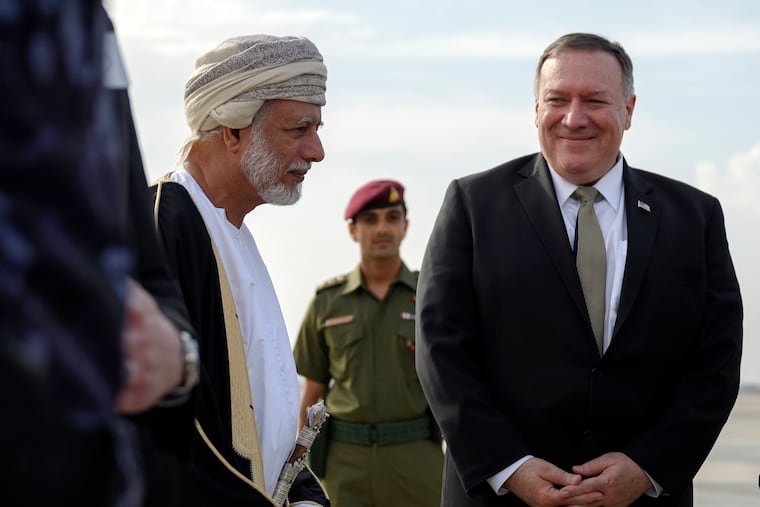Pompeo meets with Oman’s new ruler amid U.S. pressure on Iran
U.S. Secretary of State Mike Pompeo met Friday with the new ruler of Oman, a Gulf Arab country that has close ties with both Washington and Tehran and that has previously provided a back channel for talks between the adversaries.

DUBAI, United Arab Emirates — U.S. Secretary of State Mike Pompeo met Friday with the new ruler of Oman, a Gulf Arab country that has close ties with both Washington and Tehran and that has previously provided a back channel for talks between the adversaries.
Pompeo's stop in Oman to meet Sultan Haitham bin Tariq Al Said is the highest level U.S. visit to the country since he was selected successor to longtime ruler Sultan Qaboos bin Said, who died Jan. 10 after 50 years in power.
Oman supported the Obama administration's nuclear agreement with Iran and world powers, from which President Donald Trump withdrew the U.S.
Oman, like other Gulf Arab countries, is concerned that rising tensions in the region and the Trump administration's maximum pressure campaign against Iran could harm tourism and economic growth, and impact the flow of oil through the narrow Strait of Hormuz and Gulf of Oman.
The new sultan of Oman has v owed to uphold his predecessor's foreign policy approach, which was based on non-interference. Oman did not join Saudi Arabia and the United Arab Emirates in their war in Yemen, keeping its border open with the impoverished country. It also did not join in a Saudi and UAE-led blockade against Qatar. While a member of the Gulf Cooperation Council, Oman has maintained ties with Iran and hosted Israeli Prime Minister Benjamin Netanyahu in a surprise visit in late 2018.
Oman's foreign affairs minister, Yusuf bin Alawi Abdullah, greeted Pompeo upon his arrival in Muscat on Friday. He has been quoted as saying that his government is in touch with the U.S. and Iran and believes the possibility exists for dialogue between them.
Pompeo's visit to Oman is only several hours long, before departing back to the U.S.
He traveled to Oman from Saudi Arabia, where over two days he met King Salman, visited a sprawling desert air base housing some 2,500 U.S. troops and held a more than two-hour meeting, that included dinner, with Crown Prince Mohammed bin Salman.
The State Department said Pompeo and the crown prince discussed threats from Iran, the Saudi-led war in Yemen, the situation in Iraq, Syria and Lebanon, and the need for Gulf unity, an apparent reference to the political stalemate between Qatar and its Arab neighbors.
Pompeo assured the crown prince that the United States stands with Saudi Arabia in the face of Iranian threats, the State Department said.
The State Department said the two also discussed U.S. concerns about human rights.
Pompeo had said he would likely raise with Saudi authorities the case of a Saudi-American doctor facing trial who has been barred from leaving the kingdom and allegedly tortured. Members of Congress had called on Pompeo to raise the case during his visit to Saudi Arabia.
The Boston-area physician is one of several dual Saudi-American citizens either imprisoned or barred from leaving Saudi Arabia in cases related to a wider crackdown against critics and perceived foes of the crown prince.
The prince’s reputation was tarnished internationally after the killing of Washington Post columnist Jamal Khashoggi in 2018. A critic of the crown prince, Khashoggi was living in exile and writing about the prince’s crackdown on critics and activists when agents who worked for the Saudi prince killed and dismembered him inside the Saudi consulate in Istanbul.